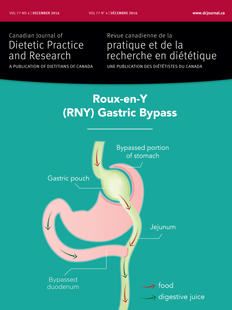Abstract
Purpose: This qualitative study, guided by a phenomenological approach, explored senior-level undergraduate, nutrition students’ perceptions of how obesity and weight bias were addressed in the undergraduate curricula and how the curricula influenced their attitudes toward individuals with obesity.
Methods: Twenty senior-level undergraduate, nutrition students from the University of Guelph participated in interviews. Interviews were audio-recorded and transcribed verbatim. Thematic analysis entailed open, axial, and selective coding.
Results: Participants’ sources of information about obesity in the curricula included nutrition courses, case studies, and non-nutrition courses. Regarding sources of information about weight bias in the curricula, they discussed nutrition courses, non-nutrition courses, and limited coverage of weight bias. Themes for curricular influence on attitudes toward people with obesity were increased knowledge of obesity, understanding the complexity of obesity, increased empathy toward individuals with obesity, and better ability to avoid stereotypes toward people with obesity.
Conclusions: The perceptions among nutrition students varied regarding the amount and type of obesity and weight-bias information in the curricula, as well as the influence of the curricula on attitudes toward individuals with obesity, suggesting that obesity and weight bias warrant more coordinated coverage in the nutrition curricula.
Résumé
Objectif. Cette étude qualitative, guidée par une approche phénoménologique, a exploré la perception des finissants du premier cycle en nutrition sur la manière dont l’obésité et les préjugés par rapport au poids ont été abordés dans leur programme universitaire de premier cycle et sur la manière dont le programme a influencé leur attitude envers les personnes obèses.
Méthodes. Au total, 20 finissants du premier cycle en nutrition de l’Université de Guelph ont participé aux entrevues. Les entrevues ont été enregistrées sur bande audio et transcrites textuellement. L’analyse thématique comprenait un codage ouvert, axial et sélectif.
Résultats. Les sources d’information des participants au sujet de l’obésité dans leur programme comprenaient les cours de nutrition, les études de cas et les cours dans un domaine autre que la nutrition. Concernant les sources d’information relatives aux préjugés par rapport au poids dans leur programme, ils ont mentionné les cours de nutrition, les cours dans un domaine autre que la nutrition et la couverture limitée des préjugés par rapport au poids. Les thèmes abordés concernant l’influence du programme sur leur attitude à l’égard des personnes obèses étaient la connaissance de l’obésité, la compréhension de la complexité de l’obésité, l’empathie accrue envers les personnes obèses et une meilleure capacité à éviter les stéréotypes envers les personnes obèses.
Conclusions. La perception des étudiants en nutrition sur la quantité et le type d’information qu’ils ont reçue sur l’obésité et les préjugés par rapport au poids dans leur programme varie, ainsi que l’influence de leur programme sur leur attitude envers les personnes obèses. Cela suggère que l’obésité et les préjugés par rapport au poids méritent une couverture plus coordonnée dans le programme de nutrition.



